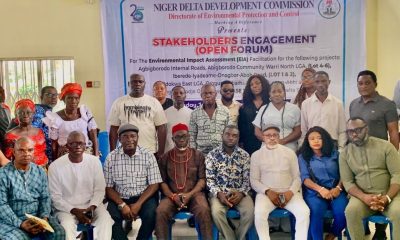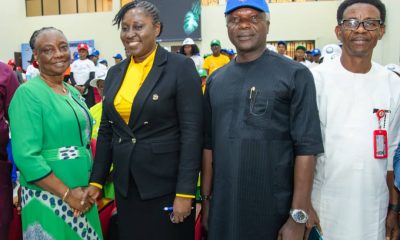NEWSXTRA
NDDC Harps On Alternative Dispute Resolution

The Niger Delta Development Commission (NDDC), has emphasised the importance of alternative dispute resolution in promoting transparency, accountability, and integrity in the workplace.
In a statement by Seledi Thompson-Wakama, Director of Corporate Affairs, the Managing Director, Dr Samuel Ogbuku, stated this during a Sensitisation Programme with the theme: “Promoting Transparency and Due Process in the Workplace: Deploying Alternative Dispute Resolution (ADR) Approaches in Building a Culture of Accountability and Integrity” organised by the Commission’s Department of Dispute and Conflict Resolution in Port Harcourt.
Ogbuku, who was represented by his Chief of Staff, Rev. Julius Oworibo, noted: “I am impressed by the quality and timeliness of this programme. ADR is a critical tool in achieving a lot in the Commission. Transparency entails being open about how decisions are made in the workplace.
“Through due process, the rights of staff are protected and trust is fostered in the Commission. The ADR mechanisms can be used to reduce tension in the workplace. These mechanisms include mediation and facilitation, amongst others.
“Over time, this approach fosters a workplace where integrity, fairness, and trust are the norm and are at the forefront of fulfilling our mandate in the region. Employees begin to trust that issues are handled openly and fairly.
“Do not forget that we are a team. To make a difference, fairness must be established across the board. ADR is not just about solving problems; it is ensuring that these are a part of our everyday work life,” he noted.
In his remarks, the NDDC’s Acting Director of Dispute and Conflict Resolution, Barrister Godwin Ogedegbe, reiterated that alternative dispute resolution was critical to achieving the Commission’s vision.
He stated: “The theme of this programme captures the core of what we seek to achieve in our Commission: a workplace where every action is expected to be guided by openness, fairness, and a steadfast commitment to due process. Where conflicts are not merely resolved, but prevented through structured, principled processes; and where accountability and integrity are not aspirational ideals but everyday practice.”
In his keynote presentation, the Founder of the Centre for Constitutionalism and Demilitarisation, CENCOD, Professor Sylvester Odion-Akhaine, underlined the importance of due process in the workplace.
He noted: “The importance of due process, transparency, integrity, and accountability in the workplace cannot be overemphasised. It is healthy for productivity and achievement of organisational goals. For workplace ethics to blossom, it requires ethical leadership that leads by example and employees with work engagement characters who are not afraid to communicate honest advice to management.”
The Director, Centre for Politics, University of Port Harcourt, Professor Fidelis Allen, highlighted the effectiveness of ADR while speaking on the subtheme: “Strengthening Organisational Governance for Transparency and Accountability: Integrating Alternative Dispute Resolution in Workplace Conflict Management.”
“ADR enhances transparent and accountable governance within organisations by promoting open dialogue, fostering a culture of responsibility, and implementing accountability protocols.
“These approaches ensure that disputes are resolved efficiently and equitably, with mutually agreed-upon outcomes that are more likely to be adhered to by all parties involved,” he noted.
In his own presentation on the subtheme “Promoting Ethical Standards and Institutional Integrity,” the Chief Executive Officer of the Dispute Resolution Academy, Dr Olugbenga Gbarada, noted that institutions such as the NDDC should uphold fairness by building strong systems.
“At the same time, leaders foster trust through ethical conduct. These, he said, create the foundation for ADR to “become a bridge toward inclusive governance, ethical decision-making, and lasting peace.”
-
CRIME4 years ago
PSC Dismisses DCP Abba Kyari, To Be Prosecuted Over Alleged $1.1m Fraud
-
FEATURED4 years ago
2022 Will Brighten Possibility Of Osinbajo Presidency, Says TPP
-
FEATURED2 years ago
Buhari’s Ministers, CEOs Should Be Held Accountable Along With Emefiele, Says Timi Frank
-
BUSINESS & ECONOMY2 years ago
Oyedemi Reigns As 2023’s Real Estate Humanitarian Of The Year
-
SPORTS2 years ago
BREAKING: Jürgen Klopp Quits Liverpool As Manager At End Of Season
-
SPORTS2 years ago
Could Liverpool Afford Kylian Mbappe For €200 million? Wages, Transfer Fee
-
ENTERTAINMENT2 years ago
Veteran Nigerian Musician, Basil Akalonu Dies At 72
-
FEATURED2 years ago
Tribunal Judgement: Peter Obi Warns Of Vanishing Electoral Jurisprudence, Heads To Supreme Court
-
BUSINESS & ECONOMY2 years ago
Oyedemi Bags ‘Next Bulls Award’ As BusinessDay Celebrates Top 25 CEOs/ Business Leaders
-
FEATURED3 years ago
2023 Presidency: South East PDP Aspirants Unite, Demand Party Ticket For Zone



































